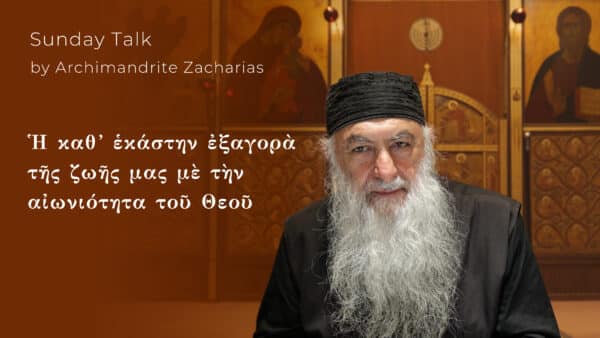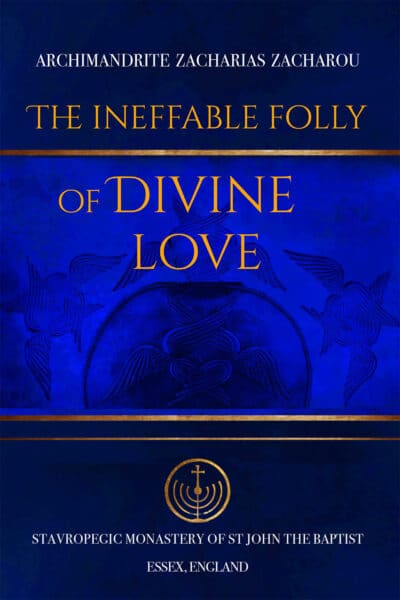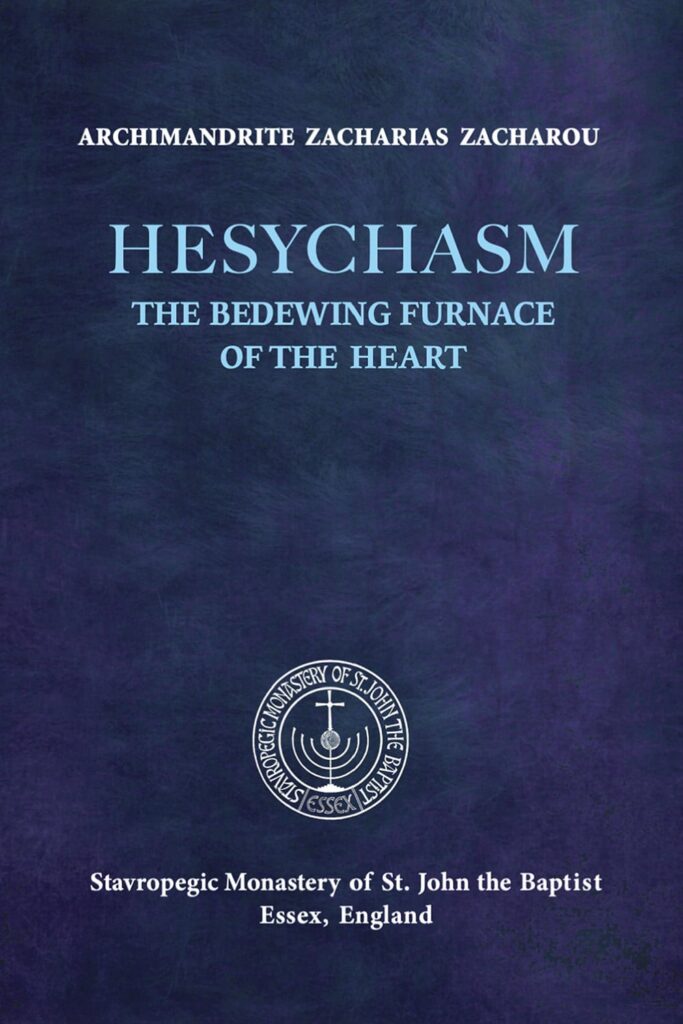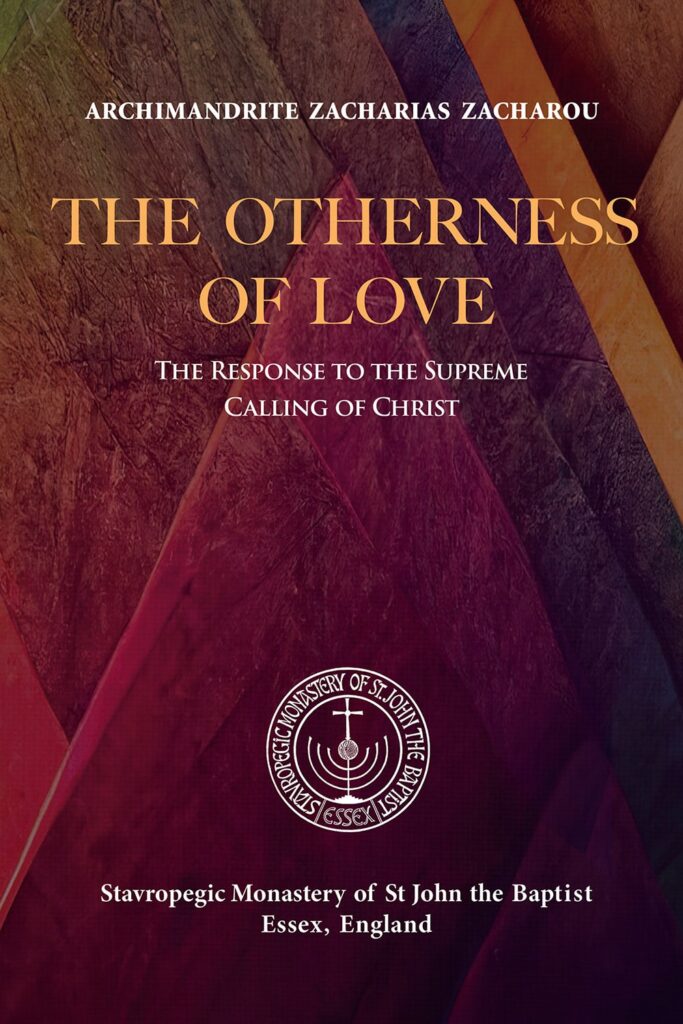In my paper about hesychasm I wanted to express that all Orthodox people form one Body. Many of the things I said about hesychasm are surely familiar to you because we all live them in the Divine Liturgy, the greatest school and treasure that God has given us upon earth. Unless we leave aside all earthly care, we cannot enter the heaven and haven of the Holy Anaphora, the heart of the reasonable and bloodless sacrifice of the Body and Blood of Christ. There is no difference between lay Christians and monks in the life of the Church. Simply monks are people who have the madness to believe and accept this form of life, and they pursue it to the end. Yet Fr Sophrony told us that if we celebrate the Liturgy attentively and participate with fear, the fruit of grace in our life will be the same as that which the hermits find through hesychastic asceticism in the desert. Therefore, there is no competition, there is no antagonism between lay Christians and monastics: there is one Body, wherein all can find the communion of grace and life, and each member strengthens the other on the path to salvation.
Question: St Sophrony writes that prayer is an infinite creation far superior to any form of art or science. What does he mean?
Answer: As the Psalm says, ‘Thy mercy, O Lord, is better than life’.1Ps. 63:3. In fact, a touch of grace is better than many lives.2see Ps. 62:4 LXX. When grace is active in the heart of man, his mind is illumined, his heart is strengthened, and horizons of Divine Being open before him, which can only be fathomed through the Holy Spirit. Then the words he utters become creative because they bear the seal of grace and inform with that grace the hearts of those who listen. Prayer is indeed an infinite creation of holiness in those who pursue holiness of life. In the book ‘The Otherness of Love’, I speak about the ‘otherness’ of God. There is nothing common between the divine world and the present, visible world. And yet, this insurmountable gulf is bridged through the grace of God, through the energy of God, and this is the otherness I have in mind.
The Otherness of Love
The Response to the Supreme Calling of Christ
We need to remain in constant touch with this otherness, and I tried to express this in my text entitled ‘Rubbing Against the Otherness of God’. The more we engage in hesychastic prayer, the more we are clothed with the garment of immortality, and therefore we become double as the Lord became double for our salvation. Although He was Divine, the Son and Word of God, He clothed Himself in human nature and became man in order to reach us secretly, humbly, without scaring us, and to impart to us the true Life that saves. He came so secretly and did all things in such a humble, hidden manner, that even His disciples could not understand what was happening, until they received the Holy Paraclete from on high. We are human but can become double by receiving the grace of being in the image and likeness of God. We have the possibility to incarnate this otherness of God, His energy, His grace, and we therefore become double in nature: while we bear human nature, we also receive the divine, but in its energetical form, not in the essential form that only pertains to the Three Persons of the Holy Trinity. Consequently, hesychasm is one of the most important and central presuppositions for bridging the abyss between the eternal and the created.
Question: Is there divine self-hatred and demonic self-hatred? How are they different?
Answer: There is self-hatred inspired by God, which comes out of gratitude for the treasure we have received with His grace. We were vouchsafed such a treasure and wonder in the gift of Christ that we cry aloud like Righteous Elisabeth: ‘Whence is this to me that my Lord should come to me?’. 3Luke 1:43. Then we hate anything in us that does not conform to the gift we received from God, and this is the true self-hatred, which is inspired by God and inspires the bond of perfect love for Him. As for demonic self-hatred, it is accompanied by depression, despair, total lack of desire to pray – to whom to pray? We pray with self-hatred to Him Whose image is imprinted in our hearts: we stare at Him continually, and we want to surrender to Him entirely all our will, all our senses, all our mind, all our love. It is for this greatest virtue of self-surrendering to the will and Providence of God that the Mother of God received the incomparable grace of Divine Maternity. In truth, there is no greater virtue than surrendering to God’s will, for perfection of salvation comes when the will of man is conformed to the divine will.
Question: How can I forgive and even love someone who is hurting me?
Answer: We forgive and love our brother because we love God. If we love God, we will do what He did. St John of the Ladder says that when we are hurt and have thoughts of resentment, we should look at the Cross of the Lord, and let us see if any resentment can remain. If the Lord was sinless, spotless, blameless, and yet did this for our sake, why should we not do the same for our fellow people, who are weak, sinful and in need of healing just like us? We should love them out of compassion, but this compassion is the work of grace. Those who take seriously the commandments of the Lord and fulfil them ardently, love even their enemies, just as the Lord loved His enemies. And He loved us not only once, but He continues to be the servant of our salvation, benefiting and helping His enemies to become His friends for ever. In the Liturgy we all form a gathering of sinners, that is, of enemies, for sin is enmity with God,4Rom. 8:7 and yet in this Liturgy, the Lord gives His life, His Body and Blood to His enemies. So, if we love God, we will endure every hardship. As the Psalm says, ‘For the words of Thy lips, O Lord, I have kept to the hard path’.5Ps. 17:4..
Question: What is the meaning of ‘Keep thy mind in hell and despair not’?
Answer: When two people deeply love each other, there is only gratitude between them, and a holy competition as to who will do more for the other. Likewise, when man begins to experience truly the love of God, his desire is to diminish himself and become a zero before this God, Who bestowed upon him such a perfection of life. Our God is the God that creates from naught, and there is no more powerful naught from which God can regenerate our life and bestow upon us the richness of His gift, than the zero of accepting even hell, giving glory to Him and magnifying Him, as St John the Baptist said, ‘He must increase, and I must decrease’.6John 3:30. This was the desire of the holy Forerunner at a time when the whole people of Israel looked upon him as the awaited Messiah. He put all this glory at the feet of Christ and placed himself even lower than the feet of Christ, saying: ‘I am not worthy to unloose the latchet of His shoe’7John 1:27. For this reason, the Lord witnessed that he was the greatest of those born of a woman.8Matt. 11:11.
In the life of the righteous of the Old Testament and of all the saints in the history of the Church, we constantly find the same experience of life, but each time expressed in different words and ways. Another example is Isaiah: when he saw the glory of God, he said, ‘Woe is me! for I am a man of unclean lips, and I dwell in the midst of a people of unclean lips: for mine eyes have seen the King, the Lord of hosts’.9Isa. 6:5. Prophet Daniel says, ‘To Thee, O Lord, all righteousness, all glory, to me the shame for my unrighteousness’10Dan. 9:8. This is the spirit of ‘Keep thy mind in hell and despair not’: to stay our mind in that effort of becoming a zero, a naught, because we know that this is the most suitable material for God to recreate our hypostasis. This is why, as St Andrew of Crete says in one of his homilies on the Mother of God, those who are truly saints are delivered to experience hell in their life, abandonment by God and persecution by people. God allows that they be deprived of every comfort and of every honour, not that they perish, but that they explore even that terrible place called hell, to which the Lord descended in order to liberate those who were kept captives therein.
Thus, God allows His saints to experience even hell so that they know all the length of the downward way of Christ leading from heaven to hell. Only then can they acquire perfect knowledge of the whole Person and way of Christ; only then can they know totus Christus. This experience was expressed by St Silouan in a very axiomatic beautiful way as a spiritual law, ‘Keep thy mind in hell and despair not.’ Many saints such as St John of the Ladder, St Symeon the New Theologian, St Andrew of Crete, St Macarius the Great, all speak about this experience, but they rather explain it, whilst St Silouan defined it so powerfully and concisely. This was necessary for the people of our times: hell is a more and more common experience, and St Silouan gave us a truly wonderful and perfect word in order not to despair.
Footnotes
- 1Ps. 63:3.
- 2see Ps. 62:4 LXX.
- 3Luke 1:43.
- 4Rom. 8:7
- 5Ps. 17:4.
- 6John 3:30.
- 7John 1:27.
- 8Matt. 11:11.
- 9Isa. 6:5.
- 10Dan. 9:8.




